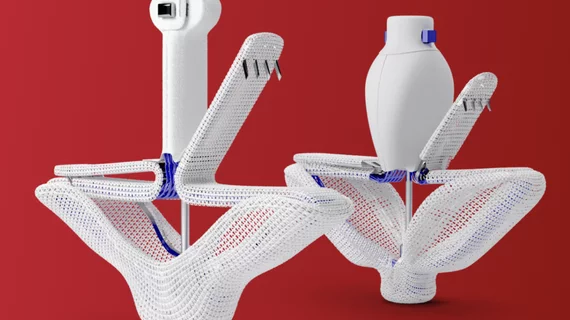Pascal transcatheter mitral repair device performs as well as MitraClip in late-breaking CLASP IID Trial
Results of the first randomized controlled trial to directly compare the Abbott MitraClip and the Pascal Precision transcatheter edge-to-edge repair (TEER) devices found Pascal was non-inferior compared with MitraClip. There was also a suggestion in the data it may perform slightly better. This was the result of the CLASP IID trial, presented at a late-breaking study at the Transcatheter Cardiovascular Therapeutics (TCT) 2022 meeting.
This comes on the heels of the U.S. Food and Drug Administration (FDA) granting market clearance for the Pascal based on the CLASP IID pivotal trial data. This brings a second transcatheter mitral repair device to the U.S. market nearly a decade following MitraClip's clearance in 2013.
Read more about Pascal getting market approval in the article FDA clears Edwards Pascal device for transcatheter mitral valve repair.
The trial looked at TEER for the treatment of degenerative mitral regurgitation (DMR) in patients with significant symptomatic DMR who are not eligible for mitral valve surgery.
"The CLASP IID trial demonstrated both safety and effectiveness of the Pascal system and met non-inferiority endpoints compared to MitraClip,” said Scott Lim, MD, director, Advanced Cardiac Valve Center and professor of medicine and pediatrics at the University of Virginia, in a statement from the Cardiovascular Research Foundation (CRF). “The outcomes between the two groups were largely comparable at six months."
Lim said this is an important step in expanding transcatheter treatment options for patients with significant symptomatic DMR. He added that the outcomes for both devices in the trial was good news for patients.
“The excellent safety and effectiveness outcomes in both treatment groups show the tremendous improvements in contemporary transcatheter mitral valve repair as well as operator skill and experience," Lim explained. "We look forward to continuing patient follow-up to five years to examine the long-term outcomes with the two repair systems.”
The Pascal also showed longer-term improvement in positive outcomes seen at discharge, sustaining MR reductions further out than MitraClip.
“Further analysis revealed that in patients randomized to receive the Pascal device, there was a high degree of acute reduction to MR ≤1+ which was sustained at six months. While a similar reduction to MR ≤1+ was observed with the MitraClip device at discharge, some loss of efficacy was observed over the same course of follow-up. Longer term data is needed to elucidate these findings,” added Konstantinos P. Koulogiannis, MD, Morristown Medical Center, another investigator in the CLASP IID trial, said in the CRF statement.
The Pascal gained European CE mark certification in 2019 for the treatment of both mitral and tricuspid regurgitation.
Pascal vs. MitraClip CLASP IID trials details
The CLASP IID trial was a prospective, multicenter, international, randomized controlled trial to evaluate the safety and effectiveness of the Pascal transcatheter valve repair system compared with the MitraClip system in patients with significant symptomatic DMR.
Patients with 3+ or 4+ DMR at prohibitive surgical risk were considered for enrollment. Those who were deemed candidates for TEER with both systems were randomized to undergo treatment with the Pascal repair system or the MitraClip system at a 2:1 ratio.
The primary safety endpoint was a composite major adverse event (MAE) rate at 30 days including cardiovascular mortality, stroke, myocardial infarction, new need for renal replacement therapy, severe bleeding and non-elective mitral valve re-intervention (either percutaneous or surgical). Echocardiograms were collected at baseline, during the procedure, discharge and all follow-up visits of 30 days, six months and annually through five years.
The analysis was completed at 180 patients in an adaptive Bayesian design. Patients were randomized at 43 sites in the United States, Canada and Europe between November 2018 and December 2021 (117 Pascal, 63 MitraClip).
At 30 days, the rate of major adverse events was 3.4% for the Pascal system versus 4.8% for the MitraClip system (Difference -1.3%, 95% CI 5.1%).
The primary effectiveness endpoint was the proportion of patients with MR ≤2+ at six months (96.5% for Pascal versus 96.8% for MitraClip, Difference -0.3%, 95% CI -6.2%). In addition, patients in both treatment groups had significant improvements in functional and quality-of-life outcomes (p<0.05).
What is degenerative mitral regurgitation?
Severe DMR is associated with a poor prognosis, including a higher mortality rate, increased heart failure hospitalizations and impaired functional and quality-of-life outcomes. Medical therapy has a limited role and in the current guidelines, surgical mitral valve repair is recommended with proven efficacy and a well-established safety profile for DMR patients who are symptomatic and/or have impaired left ventricular systolic function.
It is believed patients may be under treated due to high operative risk, under referral and aversion to surgery. In addition, transcatheter edge-to-edge repair with MitraClip may not be suitable or ideal for all anatomies, so patients need to undergo an imaging screening to assess their cardiac anatomy.
Disclosures: The study was funded by Edwards Lifesciences. Koulogiannis reported that he is a consultant and advisory board member for Edwards Lifesciences and a speaker for Abbott. Lim reported the has received research grants from Abbott and Edwards Lifesciences.

